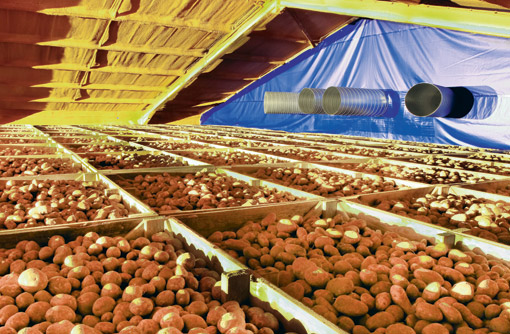Potato meet calls for transparent contracts

Rising tensions in the potato supply chain centre on returns to growers, security of supply for potato buyers and the volatility faced by all.
Oversupply in 2011 followed by a short season in 2012 has made those tensions worse than at any time in the past 35 years, said the Potato Council’s director Rob Clayton.
“Putting a real cash value on the many risks taken by growers is difficult but needs to be explored – good enterprise costings have to be the start of this,” said Mr Clayton.
Returns from competing crops were now challenging growers’ commitment to potatoes and the development of unambiguous, transparent contracts was a key issue for the chain.
The meeting found that lack of transparency and collaboration in supply chains was leading to a perceived unequal share of profit and risk, as well as to waste and exposure to volatile prices. Also there was a lack of industry awareness and cohesion about the potential downward spiral of production if future challenges were not being addressed.
“The potato industry is on the brink of an opportunity as Great Britain’s population increases,” said Mr Clayton.
“But without collective and concerted industry action, the future will feature growers shifting to lower risk crops, like cereals and maize, greater reliance on imported potatoes and a steady and painful erosion of all the support we need from crop protection, machinery manufacture and Great Britain’s science base.”
The summit, organised by the Potato Council, brought growers, trade bodies, government, packers, processors, food service representatives and retailers together.
It aimed to highlight critical issues threatening the sustainable supply of British potatoes, to generate greater awareness of issues at all points in the chain and to identify practical steps that the industry might consider to address those issues.
Summit discoveries
- Volatility is jeopardising businesses along supply chain.
- Potato industry doesn’t talk or listen enough.
- Poor knowledge of roles and pressures faced by others in supply chain.
- Growers unaware how precious supermarket floor space is.
- Food service and retail businesses not aware of looming investment crisis on farms.
- Contract terms and conditions generally do not provide peace of mind to trigger farm reinvestment.
- Growing competition from lower risk crops such as cereals and maize is growing.
Key themes established at the summit concerned risk and reward, promotion, product quality, supply chain and industry cohesion.
Unless return on investment by growers improved, good growers would leave, switch to other crops and production would fall and imports rise.
With fresh potato sales at risk, promotion was key but there was little to differentiate within the category and against other non-potato products – potatoes were at risk of becoming a “sea of beige”.
On product quality, the industry was too focused on maximising yield rather than matching the right quality potatoes with customer and consumer needs.
Summit action
Growers must:
- Understand costs of production thoroughly
- Develop and discuss capital expenditure with supply chain
- Review production practices, understand consumer needs and adapt
The supply chain must:
- Develop transparent, unambiguous contracts
- Consider longer term contracts that provide the stability required for on-farm investment
- Recognise that competitiveness of British producers is relative to overseas counterparts’
- Develop supply groups and producer organisations and encourage better communication
- Share vision, strategy and needs with producers
- Consider involving NFU in contractual discussions
Retailers must:
- Recognise urgent need for investment at primary production level
- Recognise that potatoes are price inelastic and could be a source of vitally needed cash in supply chain
- Understand the rapid impact that changes in promotion strategy or product specification can have on farm
Policymakers and funders must:
- Recognise the potato industry’s role in the British economy, providing more than 16,000 jobs
- Acknowledge the capital requirement for investment in water management and crop storage, and recognise the need for there to be continued research into crop protection, water management and genomics
- Recognise that waste management is a shared priority
Help from the Potato Council
Assistance with benchmarking, retail reports and marketing programmes is available from the Potato Council at www.potato.org.uk. A new national soil research initiative developed in conjunction with the Horticultural Development Company and HGCA offers help in managing water resources better. Sutton Bridge services can help levy payers identify the right storage investment, using financial planning tools through the Potato Council’s Business Improvement Programme. This can also help prepare for contract negotiations, says the Potato Council.
Grower risk puts potatoes under scrutiny
